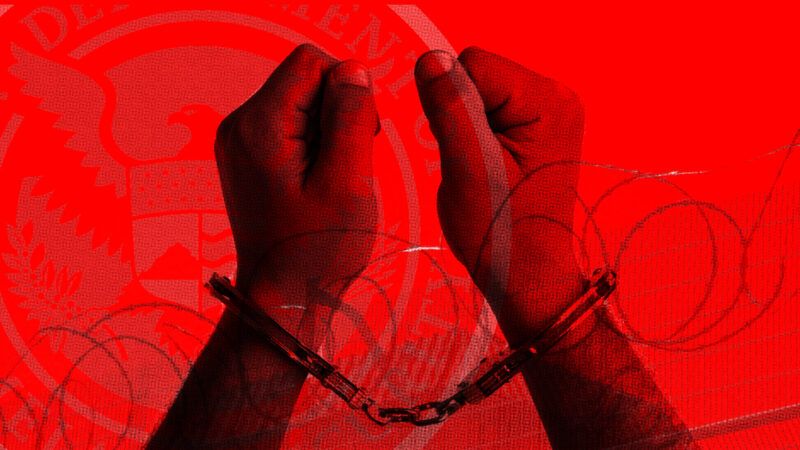This U.S. Citizen Was Detained by ICE for Over a Month. Now He's Getting a $150,000 Settlement.
A Government Accountability Office report last year documented hundreds of ICE actions involving potential U.S. citizens.

As Brian Bukle neared the end of his sentence in a California jail, he was hopeful. It was June 2020, and he was excited to be released in time to spend Father's Day with his son after serving two years. "Instead, I came this close to being deported and losing everything, a nightmare that has stayed with me to this day," Bukle said last year.
Rather than being released to his family, Bukle became ensnared in deportation proceedings and was detained by Immigration and Customs Enforcement (ICE) for 36 days, according to a lawsuit filed last November in the U.S. District Court for the Central District of California. But at no point during the legal ordeal was Bukle deportable, since he's been a U.S. citizen for over 50 years. The lawsuit alleged that ICE officials "failed to take required steps to verify Mr. Bukle's citizenship status, resulting in his wrongful arrest and detention by ICE for over a month."
ICE now has to pay Bukle a $150,000 settlement for his arrest and detention, announced Advancing Justice - Asian Law Caucus, which represented Bukle alongside the American Civil Liberties Union of Northern California.
Last year's lawsuit noted that Bukle came to the United States in 1961 when he was 2 years old as a lawful permanent resident. Originally from the British Virgin Islands, his parents naturalized and became U.S. citizens seven years later, at which point Bukle derived citizenship from them. An Immigration and Naturalization Service officer interviewed Bukle in the 1990s to see if he was deportable, says the suit—but "that officer instead concluded he was a U.S. citizen and took no enforcement action against him."
In July 2018, Bukle began to serve a sentence for assault and possession of a firearm. While in prison, he learned that he'd been placed on an "active ICE hold," becoming "distraught that he might be wrongfully imprisoned and deported after he completed his…sentence," according to the lawsuit. The California Department of Corrections and Rehabilitation had shared a list of foreign-born prisoners with ICE, and both agencies ignored repeated attempts by Bukle and his family members to prove his citizenship, the lawsuit alleged.
Bukle learned on June 16, 2020, that he wouldn't be released to his family, but to ICE. The next day, he was taken to the Mesa Verde Detention Facility in Bakersfield, where he would remain for 36 days. It took the intervention of two immigration attorneys before ICE was convinced that Bukle was indeed a U.S. citizen, the lawsuit explained. They informed officers that Bukle derived citizenship from his parents and sent them family naturalization and citizenship certificates—"records and information that had always been accessible to ICE." Bukle was released from ICE custody on July 22, 2020, and one day later, an immigration judge scrapped his deportation proceedings.
The $150,000 settlement attempts to right some grave wrongs committed against Bukle. However, he's not the only U.S. citizen to have been caught in ICE's crosshairs. A Government Accountability Office (GAO) report published last July documented hundreds of cases of immigration enforcement that ICE had carried out against potential U.S. citizens. From fiscal year 2015 through the second quarter of fiscal year 2020, ICE arrested 674 potential U.S. citizens, while detaining 121 and deporting 70. The GAO concluded that ICE's training materials on "encounters with potential U.S. citizens" were "inconsistent with ICE policy."
Immigration detention and deportation proceedings can serve as additional layers of prosecution after some immigrants have already completed their prison sentences—even if they're legally present in the country or have been exonerated. Green card holders can be deported if they commit certain crimes, which range from drug and gun charges to violent offenses. That can lead to some noncitizen offenders receiving far greater punishments than their citizen peers for the same crimes.
U.S. citizens can't be deported, and Bukle should never have fallen into ICE's hands after serving his jail time. But his detention is still indicative of collaboration between the criminal justice and immigration systems that can result in wrongful arrest and detention and, at worst, removal from the country altogether.


Show Comments (37)